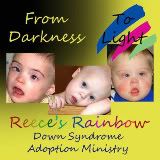Why are we still importing ANYTHING from China? Why? I found juice boxes at Wal-mart a few months back and when I got them home I read the label and it said it *could* be imported from China or other various countries. Needless to say, I took them back to Wal-mart and got my $$$ back. Why is there a need to import juice from China? Why? I bet you $10 that every single item in the Dollar Store (dollar tree) is imported from China. The article below proves to me that the country is all about making a buck no matter the consequences. The Companies don't even care if they poison the children in their own country. It makes me boiling mad....
http://news.yahoo.com/s/nm/20080922/ts_nm/china_milk_dc
By Chris Buckley Mon Sep 22, 9:44 AM ET
BEIJING (Reuters) - The number of Chinese infants sick in hospital after drinking tainted milk formula doubled to nearly 13,000 and the country's top quality regulator resigned on Monday in the latest blight on the "made-in-China" brand.
Four deaths have been blamed on the toxic milk powder, which causes kidney stones and agonizing complications, and a string of Asian countries have banned or recalled Chinese milk products.
The official Xinhua news agency said in a brief statement that the country's quality chief, Li Changjiang, had quit in light of the case. "Li was the highest ranking official brought down so far by the dairy product contamination scandal," it said.
The Communist Party chief of Shijiazhuang, home to the Sanlu Group which is at the centre of the scandal, has also been fired, Xinhua said, the latest official to lose their job for mishandling the incident.
The government has blamed local officials for delays in reporting problems with the milk powder, and an investigation has found that Sanlu began receiving customer complaints about its milk powder as long ago as last December, Xinhua said.
"Sanlu did not report (the problem) either to the Shijiazhuang government or related authorities and did not take remedial action, causing the incident to expand even further," it said, citing the results of an official probe.
The Health Ministry said the number of children hospitalized due to the milk powder contaminated with the industrial chemical melamine rose from a previously announced total of 6,244 -- which included many who had left hospital -- to 12,892, including 104 who were in a serious condition.
More than 1,500 had already left hospital and nearly 40,000 with milder symptoms "received clinical treatment and advice" before going home. The ministry did not explain the sharp rise.
The jump to more than 54,000 affected children was announced late on Sunday, escalating a scandal that has again shaken trust in Chinese products after last year's scares over toxic and shoddy goods from toothpaste and drugs to pet food and toys.
Melamine, used in making plastics, has also been found in cartons of milk and some dairy exports, but no illnesses from those sources have been reported.
Medical experts said on Monday that, as well as causing kidney stones, melamine could potentially cause far more serious complications by crystallizing and then blocking tiny tubes in the kidneys.
DEEPER FAILINGS
Chinese Premier Wen Jiabao visited hospitals in the national capital in a bid to reassure an anxious public. But he also said the outbreak of poisonings exposed deeper failings.
"Although the ordinary people are very understanding, as the government we feel very guilty," he said, according to Xinhua. "This event is a warning for all food safety."
He also vowed stiff penalties if the problem re-emerges.
China's food quality watchdog has said it found melamine in nearly 10 percent of milk and drinking yoghurt samples from three major dairy companies: Mengniu Dairy Co, the Inner Mongolia Yili Industrial Group and the Bright group.
Nitrogen-rich melamine can be added to watered-down milk to fool quality checks, which often use nitrogen levels to measure the amount of protein in milk.
Past product safety scandals have exposed corruption, influence-peddling and lumbering, feuding bureaucracies overwhelmed by fragmented, cost-cutting producers. The milk scandal has shown a government campaign did not end those woes.
China's dairy producers faced a "crisis of confidence" that would need strong official steps to cure, said Lao Bing, manager of a Shanghai-based dairy investment company.
"Consumers will start rebuying in a month or two if they feel sure the government is undertaking a vigorous clean-up," he said. "Exports will take longer. This will have a major impact."
JUMPY EXPORT MARKETS, PANICKED PARENTS
Japan's Marudai Food Co. Ltd withdrew buns made with milk supplied by Yili. A spokesman for Japan's Nissin said that group had also recalled products with Chinese dairy ingredients.
The Japanese government has asked 90,000 companies to check if imports have been contaminated with melamine.
Other markets that have banned or recalled Chinese milk products include Brunei, Singapore, Malaysia, Hong Kong and Taiwan. Taiwan banned all mainland dairy products from Sunday.
Even White Rabbit Creamy Candy, a popular Chinese brand of milk sweet, was contaminated with melamine, Singapore and Malaysia have warned.
At the weekend, a three-year-old Hong Kong girl was found to have a kidney stone after drinking a milk product tainted by melamine, making her the territory's first suspected victim.
But the biggest worry remains in China.
Sanlu, the nation's biggest maker of infant milk powder, knew about the problem but did not disclose it publicly for at least a month throughout August, when Beijing hosted the Olympics, officials have said.
The revelation brought a surge of panicky parents and children to hospitals, and the government has promised free treatment for stricken children. But some parents said they worried about costs and long-term complications.
Zhou Zhijun, from south China's Hunan province, said she took her wailing, increasingly thin daughter to hospitals at least three times from June to late August before doctors diagnosed a kidney stone.
"All those visits and checks cost 20,000 yuan ($2,900), and I still don't know who will pay for that," she said, adding that her 15-month-old baby had drunk Sanlu milk powder. "Also what if there are complications and problems later? Who'll pay for that?"
The Chinese Ministry of Agriculture said despairing farmers were dumping milk and killing cattle after companies stopped buying their supplies. It promised subsidies to help farmers.
(Additional reporting by Ben Blanchard in Beijing, Naoto Okamura in Tokyo and Kevin Lim in Singapore; Editing by Paul Tait)
Monday, September 22, 2008
Subscribe to:
Post Comments (Atom)










No comments:
Post a Comment